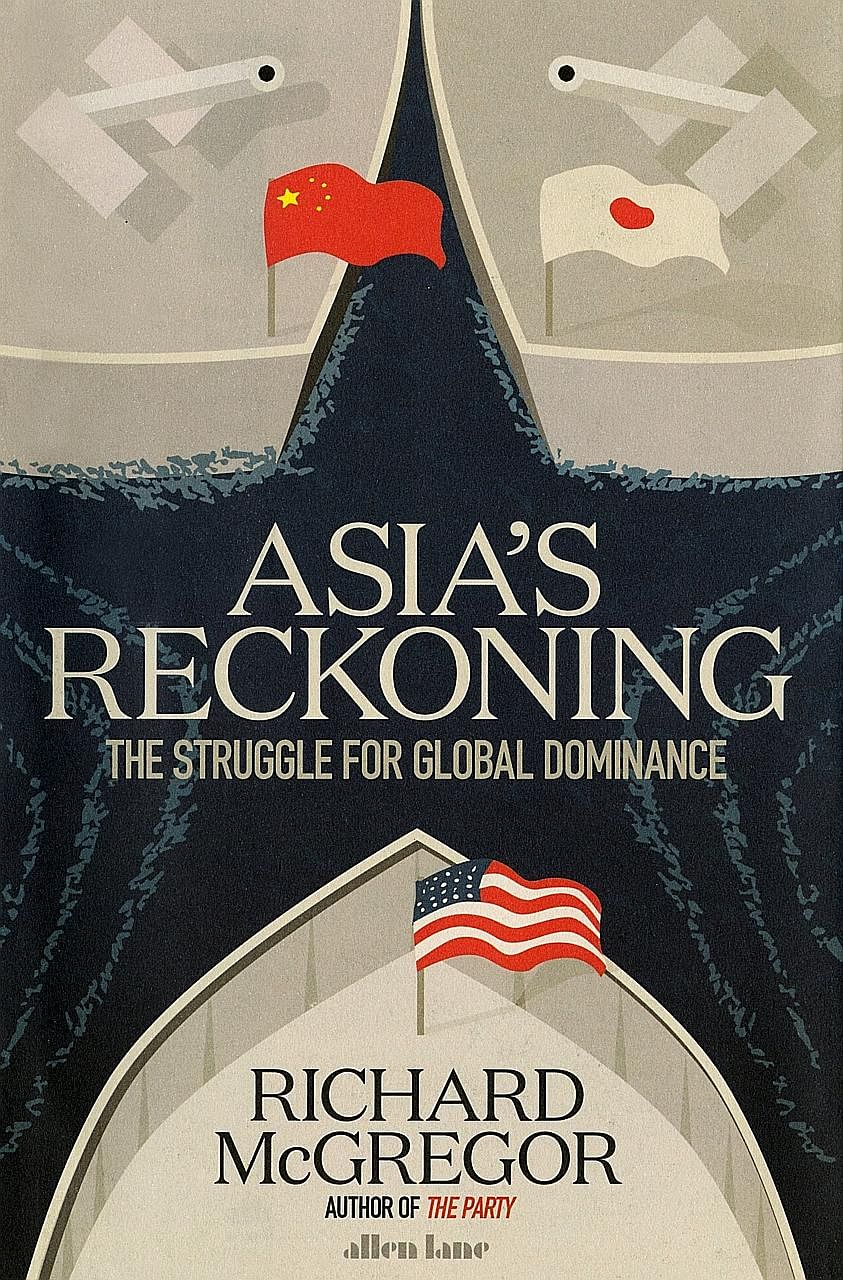ASIA'S RECKONING: THE STRUGGLE FOR GLOBAL DOMINANCE
By Richard McGregor
Allen Lane/Hardback/401 pages/ $42.80 with GST/Books Kinokuniya
A Chinese friend of Australia-born journalist Richard McGregor once said of the age-old power plays among China, Japan and the United States: "The Americans like the Chinese, but they don't like China. They like Japan, but don't like the Japanese."
As McGregor notes in his new book, Asia's Reckoning, his friend's remark "as crass as it sounds, neatly encapsulates the competing strategic and emotional strands of trilateral ties".
McGregor, an absorbing storyteller, rewards the reader further by salting his observations with savoury nuggets, such as then US state secretary Henry Kissinger's dislike of lunches with his Japanese counterpart in the 1970s because the latter always served him, a Nazi-persecuted Jew, the Austrian dish wiener schnitzel, or breaded veal cutlets. Some consider the Austrians to have been complicit with the Nazis in World War II.

His release of the book earlier this month is well-timed as North Korea has tightened tensions among China, Japan and the US this year by firing a series of long-range ballistic missiles, including over Japan, to suggest that it is now capable of shooting rockets with nuclear bombs at the US.
-
Five questions this book answers
-
1 How are China and Japan alike?
2 Why are visits to Japan's Yasukuni Shrine such a deal-breaker for China?
3 Who are the actual kingmakers and influencers in the world's three richest nations today?
4 Why has China in recent years abandoned the idea of its "peaceful rise"?
5 What does North Korea likely want from the global powers it provokes?
Last week, US President Donald Trump threatened to "totally destroy" North Korea, only for the latter's leader Kim Jong Un to retort that Mr Trump was "deranged" and a "dotard". On Sunday, North Korea's foreign minister told the United Nations that a missile attack on the US by his country was now "inevitable".
McGregor's book also comes about a month before China's President Xi Jinping is expected to be confirmed for another five-year term as the Communist Party of China's (CCP) top leader on Oct 18.
McGregor, 59, has long been an observer of East Asia and was the Financial Times' bureau chief in Beijing and then Washington, DC before he left the newspaper for a fellowship at the US think-tank, the Woodrow Wilson Center.
The married father of two is currently working on his own.
He has surpassed his 2011 book The Party, an in-depth study of the workings of the CCP, with Asia's Reckoning, in which he takes the reader behind the curtains to witness how the history of China's ties with Japan and the US unfolded after World War II.
The reader will find himself in on all sorts of secret lunches, riveting discussions on the various options for each of the three powers to strengthen its hold on Asia and perspectives from many wise people, including Singapore's late founding prime minister Lee Kuan Yew.
In doing so, McGregor also skilfully decodes for the reader what all sorts of gestures and vague diplomatic-speak really mean, which is essential to following the shadow play among inscrutable China, taciturn Japan and the now-waffly US.
For example, in 2010, The New York Times reported that China considered the South China Sea one of its "core interests".
In a Chinese context, McGregor stressed, "the term elevated the South China Sea to the stature of issues like Taiwan and Tibet - territorial red lines that, if crossed, Beijing would go to war to protect".
Most valuably, he connects all the dots in the geopolitical universe to lay bare why, for example, the US' shocking cosying up to communist China under then president Richard Nixon in the 1970s was actually brought on by Japan's prosaic refusal to reduce its export of textiles to the US.
McGregor uses the lens of history to peel back the many built-up layers of misunderstandings, mistrust and misgivings between China and Japan, even as a resurgent China tries to reassert itself in Asia - much to the dismay of a comparatively weakened Japan and its long-time ally the US.
As he quoted prominent Chinese scholar Yan Xuetong as saying: "It is not only true that China changed the status quo by getting strong, but also America and Japan changed the status quo by getting weak."
The US under Mr Trump also does not seem as enamoured of Japan as some of his predecessors were.
He said at a rally in the US state of Iowa last year: "If we're attacked, Japan doesn't have to do anything. They can sit (at) home and watch Sony televisions, okay?"
The rub, argues McGregor, is that the US is ignoring the Greek historian Thucydides' lesser-known warning of a trap for those with imperialist ambitions, that is, it is more dangerous to let go of an empire than to build it.
Worst of all, for now, it looks like Mr Kim has China, Japan and the US by the short hairs by forcing them to second-guess what he will do next, at a time when the US is less willing to protect Japan against an assertive China, while a militarily weaker Japan bristles at China's consistent show of strength against Taiwan and in the South China Sea, among other sore points.
McGregor's book is a deep, elegant complement to British historian Martin Jacques' masterly 2009 study, When China Rules The World.
In a nutshell
THE GOOD
Richard McGregor's precise observations and incisive analyses of the dynamics in the China-Japan-United States relationship are valuable as there are few avid news-watchers today who remember that the roots of the awkwardness among these countries lie in Japan beginning to carve up China from the late 19th century.
Japan, he notes, was brazen enough to do so because it had bested China in the modernisation stakes, making the latter, which always saw Japan as its little brother, feel inferior.
So it was that Japan sliced away Taiwan in 1895, leaving China with a still-festering wound.
Then came the bone-crunching Nanjing Massacre in the 1930s, in which Japanese soldiers butchered hundreds of thousands of Chinese. Some Japanese still deny the massacre took place.
In doing so, he busts myriad myths that have long swirled around this uneasy trio of nations, including the fact that the Chinese, especially former chairman Mao Zedong, did not initially press for Japan to apologise for its wartime atrocities.
THE BAD
For more recent American views on China and Japan, McGregor quotes from a few memoirs, including those of former US secretary of state Condoleezza Rice, US diplomat Christopher Hill and former US treasury chief Timothy Geithner. Save with Mr Geithner, it is head-scratching as to why McGregor did not do fresh interviews with these policy-makers - his knack for drawing out insights from thinkers would likely have yielded deeper insights from the people whose memoirs he tapped.
Get insights to ageing
Professor Kua Ee Heok, Singapore's doyen of dementia studies, will take readers' questions on ageing tomorrow. Prof Kua, the former chief executive and medical director of the Institute of Mental Health, is now the Tan Geok Yin Professor of Psychiatry and Neuroscience at the National University of Singapore's Department of Psychological Medicine and Senior Consultant Psychiatrist at the National University Health System. He is also part of the World Health Organisation's Global Study on Dementia.
Join him and The Straits Times senior writer Cheong Suk-Wai to talk about his new book, Colours Of Ageing, from 6.30pm in The Possibility Room, Level 5 National Library Board headquarters at 100 Victoria Street. Sign up for it at any NLB e-Kiosk or go to http://www.nlb.gov.sg/golibrary and look for "The Big Read Meet".


